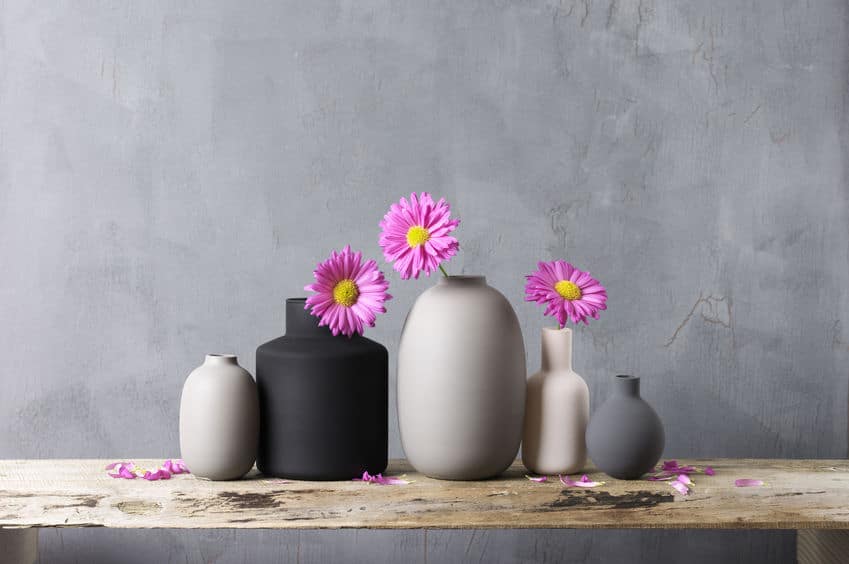There are times when life unfolds in a very different way than we would have liked or imagined, when we have no control and are forced to face the imperfection of a situation. We are experiencing one of those times right now with COVID-19: a situation that no one expected and that has turned our lives upside down. It is in moments like these that we can return to the simple but profound philosophy of Wabi-Sabi, one of the Japanese secrets for a happy life.
Wabi-Sabi refers to an aesthetic philosophy and vision applied to objects, which alludes to beauty in imperfections and the value of the passage of time, and openly accepts the deterioration and transience of existence, both human and material. For example, a lovely porcelain teacup that has been used for many years—it is chipped and scratched from use, but has acquired value and beauty from its rich history. But, beyond the aesthetic perspective, Wabi-Sabi also has lessons for our daily actions and the way we conceive of the world and life itself.
Richard Powell, author of the book Wabi Sabi Simple, notes that, “Nothing lasts, nothing is finished, nothing is perfect”—and to this I would add, that is fine. It is necessary to learn that we can find beauty in imperfection, that we must honor the fleeting nature of experiences and existence itself by savoring and living in the present moment, that life is not and will not be perfect but that it is beautiful, and that nothing is permanent, which is why every moment is sacred.
We may be frustrated with a situation, we may feel that things are not as we would like, we may wish that some things lasted longer and others were over sooner. We suffer when our plans don’t go as we expected, or when an experience is not as perfect as we had hoped. Wabi-Sabi can help us adapt in a healthy way to the changes and endless cycles of life. As Charles Darwin wrote, it is not the strongest or most intelligent species that survive, but rather the most flexible and adaptable.
During this time, we are faced with a call for attention and a reminder to return to the essential—the simple and magical aspects of life. We can learn to recognize beauty and appreciate imperfection and impermanence as an opportunity to grow and to live to the fullest.
How can we start to practice Wabi-Sabi? Here are four ways to take this philosophy into everyday life.
Savor the present moment. Much is being said and written now about the practice of mindfulness—the art of living in the present—and how we can train our minds to be in the here and now, so we can enjoy the positive moments of each day. We can start by taking a few minutes daily to focus on breathing, body sensations, or emotions. Mindfulness practice invites us to be present throughout the day: to enjoy that first cup of coffee in the morning, to contemplate the clouds and their movement with amazement, to listen more deeply, and (when we can do so safely) to hug each other heart to heart.
Embrace your personal story. Reflect on the path you’ve traveled, on all the ups and downs, and bring attention to the moments of joy, learning, and transformation (both external and internal) that you have experienced over time. Each person has a unique story with its own authentic and particular beauty. Reflecting and writing about these moments allow us to cultivate perspective and feel a sense of accomplishment and empowerment. It is equally important to give love to the scars that have marked our lives; we must not forget that each one of them adds value to our personal history.
Extract learning. When things do not go as we expect or we are surprised by events that alter the order of our lives, what we can learn from the situation? Learning shifts us from victims to creators, allowing us to adapt and cultivate a resilient attitude toward change, loss, and transition.
Find beauty in simplicity. We can learn to redefine beauty, to expand our gaze, and to bring into focus elements that elicit joy and appreciation. We can do this with the objects we’ve gathered around us, with our everyday interactions with those we meet or live with, and also with nature. You might try taking pictures of the beauty you observe each day, and creating a Wabi-Sabi album.
The time has come to embrace change, fleetingness, and imperfection as a source of beauty, wisdom, and growth. We often speak of the “ravages of time”; we are conditioned to resist aging and seek eternal beauty and youth. Time does not wreak havoc—time shapes works of art and gives value to both objects and people. How wonderful to be able to tell stories, and to have wrinkles and scars (internal and external) that have marked the path of a lifetime.

Valentina Marín
Valentina Marín, from Bogota (Colombia), studied communications at university but found her calling in the field of happiness and positive psychology. She graduated from CiWPP in 2018, and is currently earning a Certificate in Happiness Studies. Valentina is the national chief happiness officer at a university in Bogota, works with companies and teams to provide tools for building their paths of joy, and teaches monthly workshops. Learn more about Valentina at senderosdealegria.com.co.



Nice article. Take advantage of the small pleasures in life is so needed during this time.
Thank you very Much
Thank you!
OK parts of me have always been about the Wabi Sabi philosophy. No I’ve always seen perfection in imperfection. I’ve always appreciated things worn by time because it reminds me of the love that it had from generations past. Thinking that we stand on the shoulders of those that went before us. A beautiful thought.
I am, at this very moment, taking photos of my jewelry for my new website. As I was writing the description for a particular pair of earrings that, because of the design, made it impossible for me to make both of them exactly alike I decided to call them “Wabi Sabi” or, “perfectly imperfect”. And this lead me to your beautiful site. I’ve been feeling terribly low lately and cannot seem to pull myself out of this funk that’s found me. Reading more than what I already knew about Wabi Sabi has lifted my soul. I have bookmarked this site and know I will read it often. Not only does it reflect my style and concept of jewelry, I know now that it can give me the wings I need to lift my heart and soul, if only for a little while ~ out of the darkness!
Beautifully penned article
What a beautiful philosophy, one I’ve lived and internalized over a long-lived life, without naming it or knowing the words Wabi Sabi. Thank you for this article, for me, an invitation and gentle reminder of how easy it is to make these four ways a meaningful part of my everyday spiritual and personal growth journey. And thank you for sharing your website.
Thanks, especially the idea of redefining beauty and take pictures of everyday things.
My boyfriend sent me this link, I’ve been facing a lot lately and he’s apparently been practicing wabi sabi for a while and its helped him, thus it will definitely help me right? This is a beautiful way to approach life, with positivity and gratitude. I will definitely begin my own journey with wabi sabi, I’ve been inspired. Appreciated
I’ve been going through a phase(I call it a phase because I refuse to let it be permanent) where I seem to be surviving instead of living, my boyfriend sent me this link and im grateful because this is definitely something he d like to practice and get better at.